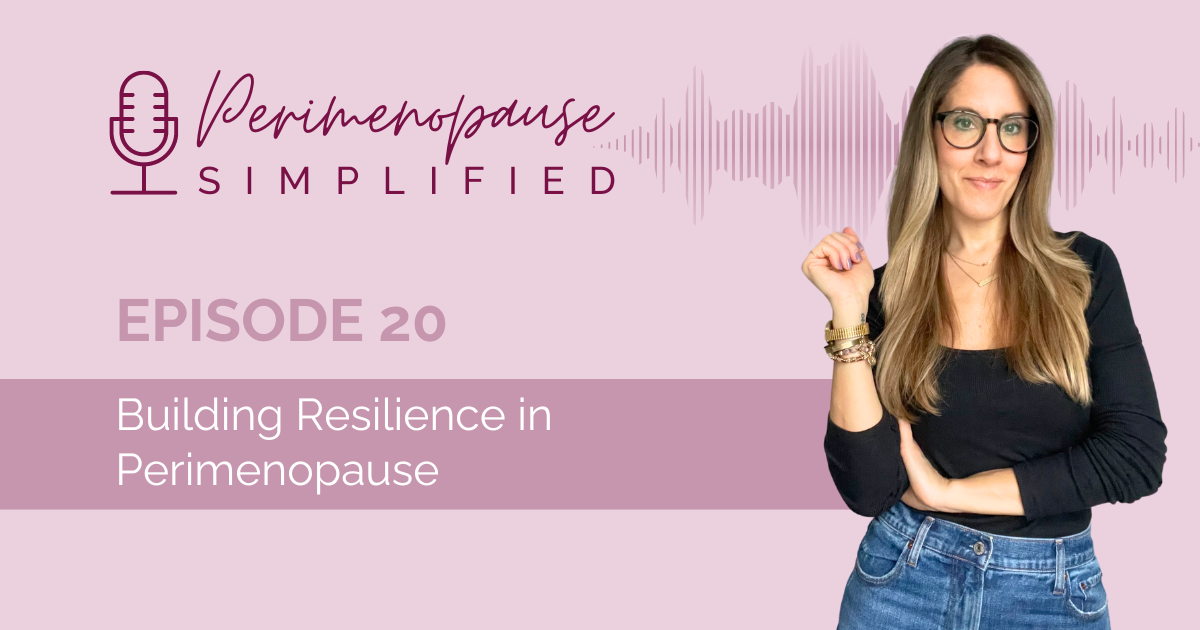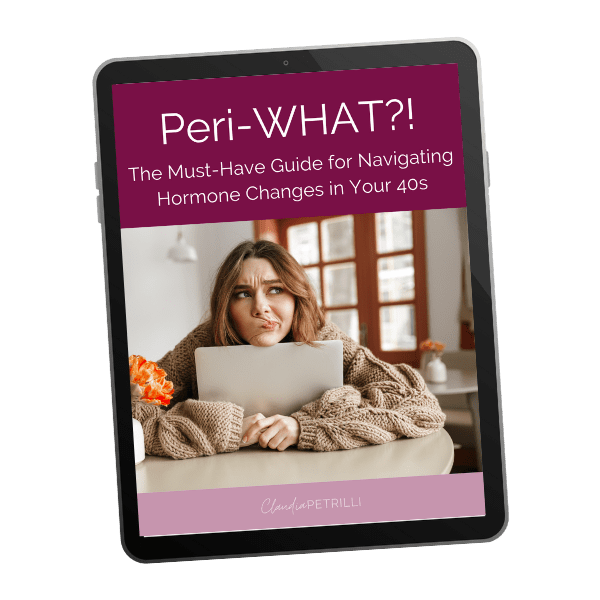
20: Building Resilience in Perimenopause
Don’t Miss An Episode!
In this episode, we covered:
- Why you need to build this “muscle” in perimenopause
- The many challenges that come in this stage of life
- What we can and cannot control in life
- The choices we get to make
- What to do when life throws curveballs at you
Building Resilience in Perimenopause
Hey welcome back, I hadn’t planned on talking about resilience today but I believe it’s such an important topic and it’s something that I’ve gotten fairly good at building over the years, so I want to share some of that with you.
What is Resilience?
But first, what is resilience? It is the capacity to withstand or recover quickly from difficult situations. The ability to adapt to stressors, to “bounce back” after hard times. And while many people think it’s a personality trait, like being a “strong person”, it’s actually something you can build over time. I believe we all have the ability to overcome adversity and build resilience.
The Importance of Building Resilience During Perimenopause
In our perimenopausal years, it’s incredibly important to ‘build this muscle’ if you will. Because between the loss and erratic fluctuation of hormones in this stage of life, and all that we’re dealing with, we are less able to handle stress.
Challenges of Perimenopause
We are more stress reactive and perimenopause itself can be stressful, as you know. Your body is changing, your menstrual cycle is unpredictable, you don’t feel like yourself, you’re not sleeping as well, you’re probably not getting the support you need…not to mention this stage of life can be really challenging dealing with kids if you have them and aging parents. I’m dealing with that right now with my mom who is almost 72. I spent some of last week and this morning calling doctors and insurance companies for her, in the middle of running a business and supporting clients. So I get how much you have on your plate.
How Stress Affects Your Body
When your body is in a stressed state, it’s gonna prioritize production of stress hormones over other hormones, because it’s trying to protect you. And that slows everything down, including your thyroid, digestion, metabolism, detoxification, and worsening your perimenopausal symptoms. If you want to learn more about the stress & perimenopause connection, go back and listen to episode 13.
Personal Story: Dawson’s Health Scare
But the reason I was prompted to talk about resilience today, is because we had a scare with our dog, Dawson recently and like many of you who are pet parents, you know how awful it can be when they’re sick or in pain. And you just feel helpless and want to do everything you can to make them feel better, as soon as humanly possible.
Recognizing the Signs
To give you some background, about a week ago, I was walking Dawson and midway through the walk, he started to slow down. He got very fatigued, then wouldn’t drink or eat for the rest of the day.
Seeking Medical Help
I just figured he had an upset stomach. So I kept an eye on him and decided I’d call the vet if he didn’t improve.
The next morning, same thing: he was very lethargic, wasn’t eating, or drinking. And when we tried to take him out for a walk, he stood up, and his hind legs gave out, he fell and couldn’t get up. As you can imagine, it scared the hell out of Mike and I.
Diagnosis and Emotional Impact
We rushed him to the nearest animal hospital and about 5 hours later, they said he may have IVDD (intervertebral disc disease). Essentially it’s disc degeneration, which happens in humans, but also in dogs. Super common with certain breeds.
Dawson hadn’t been eating or drinking, because he was in so much pain. The vet told us the severity and type of disc injury can vary widely, from mild discomfort…to paralysis.
Mike and I just looked at each other in defeat. Our hearts just sank. We adopted Dawson 7 years ago and he’s definitely been our ‘problem child’. He’s got some behavioral issues, anxiety and he’s very protective of us. We’ve spent an exorbitant amount of money on trainers, have put a lot of work into training him and have done the best we can.
Moving Forward with a Plan
He’s so full of energy, gets super excited, and can be very playful. Ge’s really so sweet with his mom and dad – he fully trusts us and we love him so damn much. So to think he could potentially become paralyzed is just heart-breaking.
So long story short, we left the animal hospital, with pain meds, a very tired dog…and fear of the unknown.
Building Resilience
But I’m not someone who tends to stay in that place – of panic, worry, and thinking of all the “what ifs” or worst case scenarios.
Instead I chose to take action and researched the hell out of IVDD in dogs to better understand it. And now, we have a plan in place and today, we are very hopeful. He had a really good weekend and we’re already seeing some improvements on what we anticipate will be a long journey. But we’re prepared and ready to do whatever is needed to get him to heal.
Overcoming Life Challenges
So I share this because just like most people, I’ve definitely had my fair share of life challenges – between growing up in a tumultuous home, my health issues over the years, multiple car accidents, break-ups, financial struggles, business challenges, caring for sick family members, losing loved ones, and so on. These are things that shape us and if we allow them to, can impact us negatively. Or we can choose to learn from them.
Learning from Adversity
With all of those life challenges, I’ve learned to be less reactive, put one foot in front of the other, and because of that, have built a helluva lot of resilience.
And even in moments when I feel like I can’t handle something, I realize fairly quickly, those are just thoughts that are coming from a place of fear and uncertainty. Not necessarily the truth of the situation.
Controlling Your Reactions
What I’ve learned in my 40+ years on this planet is that we CANNOT control what happens to us. We can certainly try and take precautions and be prepared. But we can’t control everything. What we CAN control is how we react to pretty much every situation.
Mindset Shifts
I tell myself this over and over and over again. Because when I flip the script in my mind, when I choose a different thought or action, I have always figured it out. No matter how hard it was.
Dealing with Curveballs in Life
And in this stage of life, as we’re dealing with hormone fluctuations, health challenges, doctors who dismiss us, maybe you have little kids or kids leaving for college or kids getting their license (which is terrifying), or aging parents like I’m dealing with – we are bound to have curve balls thrown at us.
Making Choices
So the question becomes how are YOU going to handle it?
…are you going to choose to freak out or are you going to choose to breathe and take one step forward? …will you try to figure it out alone or will you humble yourself and ask for help and support? …will you choose to neglect yourself in these times or will you choose to take care of yourself knowing that will help you better care for others?
Personal Approach to Handling Stress
We get to decide.
And with all that happened with Dawson, I chose to take one step forward, ask for help, and care for myself in the process.
Self-Care Practices
Even though I’ve been worried about him and haven’t been perfect with my workouts or hitting my daily steps, I still made it a point to take my daily walks, aim to get 7 hours of sleep each night, feed myself good food, and make time for self care, like an epsom salt bath, time spent outdoors or a nap.
Recommendations for Building Resilience
So when life throws you a curveball or two, here are some things I recommend:
Connect with People Who Can Help You
Be open to receiving support and help; don’t try to do it alone or let your ego get in the way thinking you can “handle it” – the whole “i’m fine” line is bullshit
Take Action
One step in front of the other, make a decision and do something
Be Kind to Yourself
Give yourself grace, take a bath, go for a walk outside, get coffee with a friend – anything to make you feel good
Stay Hopeful
Versus think about the worst case scenario – worrying does absolutely nothing to improve a situation, but it does add more stress to your body – so which do you choose?
Allow Yourself to Grieve
If you need to grieve, allow yourself to grieve. We are at the age when people around us may die. We lost a family member earlier this year and it was a shock. Her daughters are in their perimenopausal years, with kids of their own and it’s been such a loss. So, don’t rush the grieving process. Be patient with yourself.
Move Away from a Victim Mentality
This is when you think something bad always happens to you or others are out to get you; this is a learned behavior that you CAN change. Remind yourself that you’re strong and capable and you can control how you react to everything and everyone.
Take Care of Yourself
Stick to the basic health foundations like: proper hydration, good nutrient-dense food, light movement, sleep, and connection with people you love
Final Thoughts on Resilience
Even though I said we are stress-reactive in our perimenopause years, I refuse to believe that I or YOU “cannot handle stress”.
When we choose to look for the positive, give our body what it needs, and seek support, I truly believe we can thrive in perimenopause – and beyond.
Adopting this mindset is what builds resilience my friends. I hope you enjoyed that episode and I’ll see you next week.
AS MENTIONED IN THIS EPISODE:
LISTEN TO EPISODE 13: Stress & Perimenopause: What’s the Connection?
WORK WITH US: The Hormone Rescue Program
Claudia Petrilli is a Functional Health Coach, Integrative Nutrition Coach, Women’s Health Educator, and creator of The Hormone Rescue program. Having experienced debilitating periods, digestive issues, a sluggish thyroid, a pituitary tumor, and perimenopause symptoms in her late 30s, she knows exactly what it’s like to get dismissed by doctors and spend years searching for answers.
To connect with Claudia Petrilli:
FREE GIFT: Peri-What?! The Must-Have Guide for Navigating Hormone Changes in Your 40s
WORK WITH US: The Hormone Rescue Program
QUESTIONS? EMAIL: claudia@claudiapetrilli.com
LOVE THE SHOW?! Please subscribe, leave a 5-star rating, review, and share, so that other women can find this podcast for guidance and support through their perimenopause journey!






